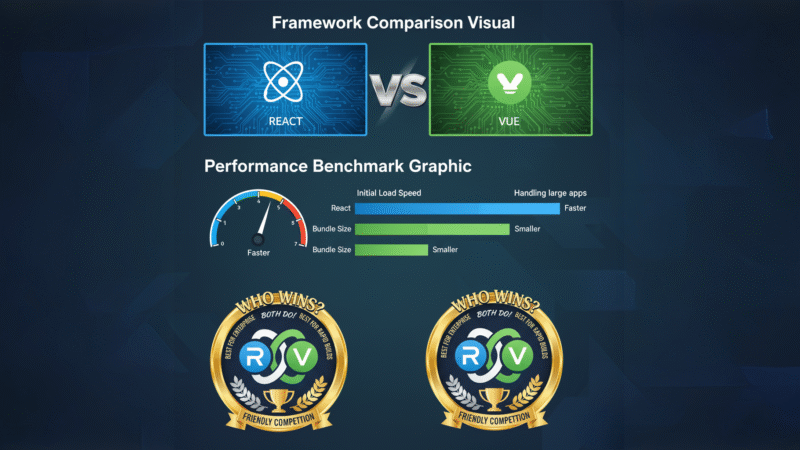React vs. Vue in 2025: Which Frontend Framework Wins?

Part 1: React vs Vue in 2025 – Foundations and Developer Experience
Introduction
In the rapidly evolving world of frontend development, React and Vue continue to lead the way in 2025. Both offer powerful solutions for building dynamic user interfaces, but each has its own approach, philosophy, and developer appeal. This article explores their foundational differences and what it truly feels like to work with each framework so you can decide which fits best for your next project.
Origins and Background
React was introduced by Meta (Facebook) in 2013 and quickly revolutionized UI development with its component-based model and virtual DOM for performance optimization. Vue, created by Evan You in 2014, took inspiration from React and other frameworks to deliver a progressive framework focused on ease of use and adaptability.
| Framework | Created By | Year Released | Notable Users |
| React | Meta (Facebook) | 2013 | Facebook, Netflix, Airbnb |
| Vue | Evan You & Open Source | 2014 | Alibaba, Xiaomi, GitLab |
Design Philosophy and Structure
React positions itself as a UI-centric library that tackles the view layer, leaving choices like routing and state management to the developer’s discretion. This gives developers maximum flexibility but requires more setup.
Vue is more of a full-featured framework that directly provides tools like official routing and state management libraries, simplifying the development setup and encouraging convention.
Syntax: The Coding Experience
React uses JSX, blending JavaScript logic and HTML markup seamlessly in the same file. This offers great flexibility and power but may take some getting used to, especially for developers new to JavaScript frameworks.
Vue separates structure and logic more clearly via HTML-based templates enriched with special directives, making it feel more familiar to developers coming from traditional web backgrounds, though advanced users can also utilize JSX.
Learning Curve and Developer Onboarding
Vue is widely praised for its approachable learning curve and excellent documentation. The framework encourages quick mastery, allowing newcomers and smaller teams to prototype and build features swiftly.
React, while immensely powerful, demands an understanding of JSX, component lifecycles, hooks, and additional libraries, which can pose a challenge for new developers but offers seasoned programmers unmatched control and scalability.
What Projects Suit Each Framework?
- React excels in large-scale applications where flexibility, extensive customization, and broad ecosystem support matter.
- Vue shines in projects needing fast setup, clear structure, and streamlined development, especially for startups or smaller teams.
Summary
This introduction dissected the core philosophies, structures, and typical developer experiences around React and Vue. The next article will delve into their performance, tooling ecosystems, real-world usage, and practical considerations for 2025 and beyond.
Read More : https://bit.ly/3KdHF2A



